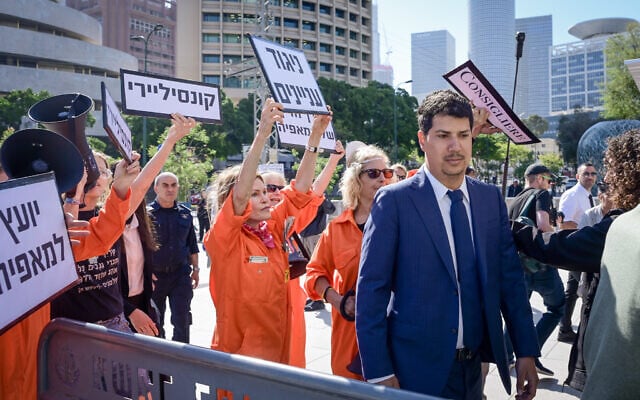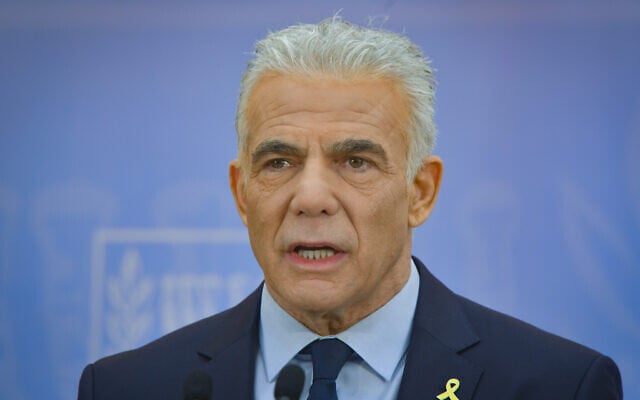



Prime Minister Benjamin Netanyahu’s top aide Jonatan Urich, a key suspect in the so-called “Qatargate” scandal, will be allowed to meet and work with the premier again starting next week after a judge on Thursday sharply rejected the police’s request to extend restrictions placed on him when he was released from house arrest earlier this year.
Urich, along with Netanyahu’s former spokesman Eli Feldstein, spearheaded a pro-Qatari public relations campaign to cast the Gulf state in a positive light ahead of the 2022 FIFA World Cup, hosted in Doha, and reportedly continued his PR work for Qatar well after the Hamas’s October 7, 2023 attack on Israel sparked the ongoing war, despite the nation’s ties to the terror group.
Urich, Feldstein and a third adviser to Netanyahu, Yisrael Einhorn, are suspected of multiple offenses tied to their alleged pro-Qatar lobbying, including contact with a foreign agent and a series of corrupt actions involving lobbyists and businessmen, all while working for the prime minister. The investigation has also expanded to cover business connections of former security officials to Qatar.
Judge Menachem Mizrahi, of the Rishon Lezion Magistrate’s Court, dismissed the police’s request to extend various restrictions placed on Urich after his initial house arrest in May.
The ruling will go into effect on Monday, giving police time to prepare an appeal.
In Mizrahi’s decision (Hebrew link), the judge voiced direct criticism of both the content of the investigators’ supposed case against Urich and the manner in which they presented evidence to the court amid the request to extend the limitations placed on him.
The restrictions on Urich, which police sought to extend until September 10, included a ban on making contact with several other figures involved in the Qatargate scandal, as well as anyone working for the Prime Minister’s Office, including Netanyahu himself.
According to Mizrahi, the police failed to produce evidence meeting the reasonable suspicion standard that Urich held the status of a public servant as defined by criminal law — a designation relevant to his culpability for potential bribery, fraud and breach of trust, for which he is suspected.
In his decision, the judge revealed some of the testimony given by Netanyahu, who spoke to the police’s Lahav 433 major crime unit in March about the Qatargate affair.
According to Mizrahi, “Netanyahu was asked if he was aware that the suspect worked for Qatar, and he answered in the negative. He added that even if it were the case, that’s the way things go, so ‘there’s nothing illegitimate, many people work for many countries. Qatar is not an enemy state.’”
“He said the suspect was a spokesman for the Likud party, and was even used as his [Netanyahu’s] spokesperson, that he was part of the public diplomacy effort, but that he did not receive a salary from the state, but rather from the party,” the judge wrote.
He noted that the premier told investigators that Urich “could work with whoever he wanted,” as he was not, in the premier’s account, a public servant.
Mizrahi also noted that in documents provided to the court, no need or intention was expressed to collect any further testimony from Netanyahu. “Therefore, the conclusion is that the prohibition of contact between him and the accused has no relevance at all,” the judge reasoned.
Moreover, he noted, Netanyahu’s military spokesman Eli Feldstein is not prohibited from speaking to Netanyahu or anyone else, despite being a central suspect in the investigation.
Mizrahi called the discrepancy between Urich’s and Feldstein’s conditions of release “a strange discrimination, lacking any logic.”
Finally, at the end of his ruling, the judge reprimanded the police representative for initially refusing to provide the court with materials from the investigation. Police ultimately agreed to send the evidence, but they provided it late in the proceedings.
“I have never encountered a response like this from the investigations unit, and that alone would have sufficed to dismiss the request,” he said.
After the decision was made public, Urich posted the text of Psalm 124 to X, including the lines, “If it had not been the Lord who was on our side, when men rose up against us; then they had swallowed us up quick, when their wrath was kindled against us… Blessed be the Lord, who hath not given us as a prey to their teeth.”
Alongside the text was a photo of him presumably reading the psalm from an open book.
Opposition Leader Yair Lapid, meanwhile, condemned Netanyahu’s remarks in his testimony. “It can’t be! It simply can’t be that Netanyahu argued to the police that there’s nothing illegitimate in his closest assistant, while working with him in his office, receiving money from an Arab state that supports Hamas. He’s not fit to lead the State of Israel.”
In response, Urich suggested the former premier also took meetings with Qataris, accusing him of hypocrisy and adding: “You’re not fit to lead the board of an apartment building. Move on.”
The Yesh Atid chair said he met with a Qatari minister once alongside families of the hostages, adding: “In my office, no one received money or bribes from anyone.”
Urich, after assailing Lapid for partnering with the Islamist Ra’am party when he was prime minister, implied that Lapid was hiding something, and threatened: “In Qatar, you met certain people. I’ll save that for a later stage. Wait patiently.”



